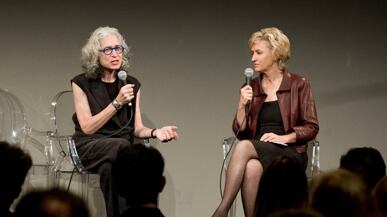At a breakfast discussion, Forgotten Children: International Adoption and the Global Orphan Crisis, co-hosted by The Daily Beast and Urban Zen, Tina Brown interviewed Dr. Jane Aronson, an adoption medicine specialist and CEO and founder of Worldwide Orphans Foundation, before an expert panel discussed the topic. Afterward, the entire room offered solutions to the issues facing the 163 million orphans around the world.
Gallery: Attendees of the Forgotten Children Conference

1. THINK LOCAL
Support the communities in nations where orphanhood and adoption are major issues—Bulgaria, Ethiopia, Serbia, and Vietnam, to name a very few. Paying attention to local issues and trying to solve problems locally is one of the first ways to begin implementing change.
2. EXAMINE THE ROOTS
Extreme poverty, which affects 1.4 billion people, is the leading cause of orphanhood. Maternal and neonatal health are negatively impacted in places where there is neither money nor education to eradicate poverty and the problems that stem from it. Family planning, said many attendees, will help bring about change.
3. ENCOURAGE CONSCIENTIOUS ADOPTION
Parents who decide to adopt children from other countries have a plethora of issues to keep in mind. As attendee Pat Williams, a Columbia law professor, stated, “We must not shy away from the degree to which adoption has, in many if not most places, become a form of trafficking in and of itself. The exchange of money that occurs in so much of the private adoption context—the literal purchase of children—is one reason that countries like Guatemala and Nepal have restricted international adoption. This kind of commodification allows many to think it is appropriate or healthy to “return” adopted children when problems arise—like so much 'damaged goods'—as though any child comes with a warranty of perfection.”
4. BETTER TRAIN ORPHANAGE WORKERS
Improving the overall quality of orphanages, training employees, and involving the community in those issues will help. Ensure orphanages are located near the communities where the children are from, and encourage visitation with biological families whenever possible. Actress Alfre Woodard, an adoptive mother herself, stood to offer the suggestion that South African YMCAs have already begun to implement: head-of-household assistance, in which the oldest child is nurtured by the community and educated, so he or she can take care of any younger siblings.
5. REGISTER CHILDREN WITH BIRTH CERTIFICATES
250 million children do not have birth certificates, according to statistics. With the training mentioned above, and governmental involvement, these children can emerge from the shadows of the system.
6. VET ADOPTION AND AID ORGANIZATIONS
Editor Tina Brown and her table suggested building a clearing house for individual and media perusal, which would enable individual, corporate, and other interested donors or volunteers to see which organizations are the best at what they do. GLAAD (Gay and Lesbian Alliance Against Defamation), noted one participant, is a great model for a sovereign arbiter. Foreign aid should be evaluated as well. “Everything we do has to have a metric, and a standard,” said Dr. Jane Aronson, the CEO and founder of the Worldwide Orphans Foundation.
7. SPREAD AWARENESS
The room called for a social media strategy connected to all organizations and the continuing dialogue. Adam Pertman, Executive Director of the Evan B. Donaldson Adoption Institute, suggested creating a media component to broaden understanding of the problem and build public/policy-maker support. Talk directly with the communities, grassroots-style, offered others. And of course, reach out to the media. “There are two journalists at my table,” said actor Hugh Jackman, whose wife, Deborah Lee Furness co-hosted the breakfast. “Their job is to shine a little light on these issues.”
8. DEMAND GOVERNMENTAL ADVOCACY
Pressure governments to prioritize child welfare, which is “like the Wild West,” noted Woodard. Ask government agencies speed up the adoption process; public-private partnerships to buy into. “Change the issue from a moral issue into a security issue” to garner broader attention and support, offered Jackman.
9. FOSTER RESEARCH, EDUCATION & OUTREACH
Develop a research base to answer questions, build support, and move forward in a methodical way. Identify causal factors for the problems, then develop methods to prevent and deal with them. Designate celebrity ambassadors and organize group volunteer visits. Encourage fundraising at every turn. And, as editor Tina Brown said, “We will do this every year.”
FURTHER RESOURCES
Worldwide Orphans Foundation Better Care Network Adoption Institute




